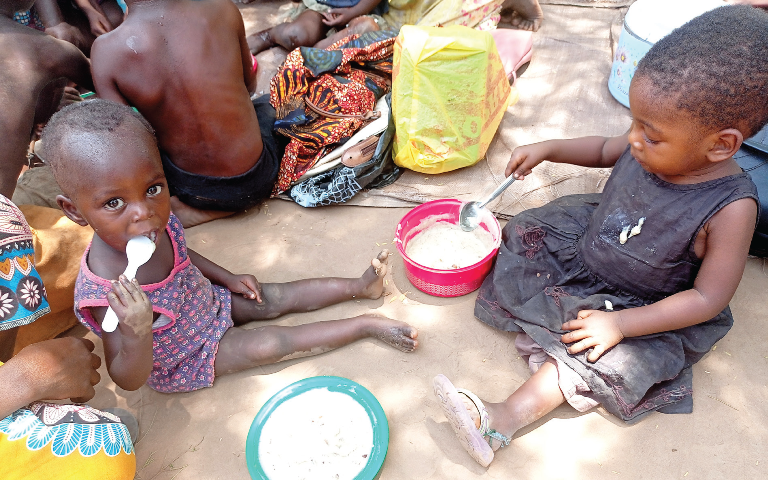Cooking groups for healthy babies
Upon arrival in Bestala Village in Chikwawa District, visitors spot a big tree where locals meet to escape the Shire Valley’s scorching sunshine.
It is midday and among those sitting in the tree shade is Patuma Maisoni, 18, the mother to Promise Banda who is in a mix of children eating food prepared by their mothers.

“Promise is a jovial and playful child though she hasn’t started schooling, she dazzles everyone. She easily makes friends with visitors,” says Maison.
Watching Promise play with other children and adults, one would hardly guess the 20-months-old girl was once severely malnourished.
Promise was born when Maisoni was in Form One. The baby weighed 3.2 kilogrammes (kg) and started eating hard food seven months after birth as exclusive breastfeeding was made difficult by hunger. Promise’s weight dropped to 2.5kg, which health workers consider unhealthy.
Narrates the single mother: “The baby was refusing to eat anything and I didn’t know how to get her to accept any food.
“My girl looked so tiny and frail that not many wanted to touch her. They left her to me, leaving me in shame. I feared that she would die of malnutrition.”
Not any longer.
When Promise was nine months old, Maisoni was approached by an old woman in the neighbourhood who introduced her to a nationwide project to scale up nutrition.
The Scaling Up Nutrition (Sun) project rolled out by Malawi Red Cross Society in her area includes cooking groups where women share tips on how to prepare diversified diets comprising the recommended six food groups.
Maisoni says the cooking group taught her to prepare nutritious porridge, now Promise’s favourite meal of the day, using flour from maize, groundnuts and beans to which she adds milk, eggs, crashed sun-dried cassava, meat soup and pumpkin leaves.
“It was probably the best decision I made after giving birth. Our lives are no longer the same. The baby is now healthy. She weighs about 9.7kg,” she states.
In Mangochi, Hanifa Kajuwe, a 23-year-old mother of two from Ntonda Village, shares Maisoni’s story, saying lack of awareness of healthy food preparation slowed the growth of her second child Haroon Maononga.
The woman could not produce enough breast milk for her son when she was diagnosed with low blood pressure. The tragedy struck within the first six months of his life, when he was supposed to be exclusively breastfed.
When the woman was discharged, the family of four had to work harder to survive and feed the two children, especially Haroon who was on the brink of malnutrition.
“We didn’t even have money to buy him infant formula milk sold in shops. When he was four months old, his health deteriorated, forcing my husband and I to take him to the hospital where health workers told us the child was on the brink of malnutrition.”
Haroon’s situation worsened as Kajuwe’s condition did not seem to improve until Kajuwe’s mother started to feed the five-month-old with porridge from whole maize flour in a desperate attempt to avert malnutrition.
The quick fix often left the baby opening bowels. By the time she was nine months old, the damage had already been done. He couldn’t hold food in his stomach, leaving him thin and weak,” she recounts.
The malnourished baby underwent nutritional rehabilitation routines at Mangochi District Hospital where health workers prescribed chiponde for the child.
“Only then did his weight begin to improve. It rose from 5kg to 6kg,” she says.
Two months on, in January, heavy rains damaged a road to the hospital, incapacitating the couple from cycling back to Mangochi to replenish the peanut butter supplement.
While searching for an urgent relief, a nurse in the area told Kajuwe about the cooking groups trained by MRCS nutritionists.
She explains: “I gladly joined in and started preparing for my children nutritious porridge from combinations of locally available foodstuffs to include all the recommended food groups,” she explains.
“At the start, the children used to refuse the new meal. But when I consulted nutritional promoters trained by Red Cross, I was told to give them baobab juice as an appetizer, which proved helpful.”
A year on, the young woman continues to follow the tips from the cooking groups to diversify her household diets and keep the children health.
Red Cross winds up the four-year project this year.
The initiative reached about 39 000 beneficiaries annually in Mulanje, Neno and Mangochi.
According to MRCS head of health and social services Daniel Kapombosola, plans are underway to scale up the project to other districts.
According to the Demographic Health Survey of 2015, some 37 percent of Malawian children aged below five are stunted—a sign of severe malnutrition.
The findings show that some three percent are wasted, 12 percent underweight and five percent overweight.
However, the burden of malnutrition varies with parents’ education attainment.
The National Statistical Office reports that 42 percent of children born to mothers with no education are stunted compared with 12 percent of those born to mothers with at least secondary education.




